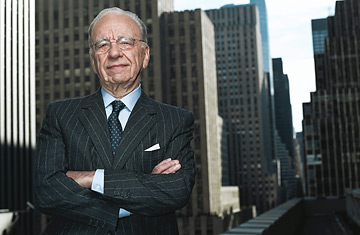
Chairman and CEO of News Corporation Rupert Murdoch
Now we'll finally get to see what Rupert Murdoch has in store for the Wall Street Journal. After months of wooing and schmoozing and pulling out just about every stop imaginable (other than raising his $5 billion offer price) to gain control of Dow Jones & Co., the paper's publisher, Murdoch looks to have finally bagged his prey this afternoon. Dow Jones and Murdoch's News Corp. haven't made an announcement yet, and the formality of a shareholder vote remains even after that, but News Corp. now appears to have well more than the 50% of Dow Jones's voting shares that it needs.
When Murdoch's bid for Dow Jones became public knowledge in May, it unleashed a national debate of sorts over whether the most controversially hands-on media mogul of our time should be allowed to get those hands on one of the world's journalistic treasures. Both outsiders and members of the far-flung Bancroft family, which has owned a controlling stake in Dow Jones since 1902 but hasn't played an active role in managing it for more than 70 years, debated the pros and cons of selling out to Murdoch in impassioned terms.
But in the end what appears to have turned things in Murdoch's favor was not any pledge of journalistic integrity but a promise by News Corp. to pay the Bancroft trust's deal-related legal fees. That, the Journal reported today, swung a key holdout, a Denver-based family trust that controls 9.1% of Dow Jones voting shares, into Murdoch's camp.
The Bancrofts own just 25% of the company. But thanks to a dual-class voting structure similar to the ones in place at the New York Times Co., the Washington Post Co. and News Corp., they control 64% of the voting shares. With the Ottaway family, which sold its newspaper chain to Dow Jones in 1970, voting its 7% against the deal and the 29% of voting shares in public hands mostly but not unanimously with Murdoch, News Corp. wanted to be sure of close to half the Bancroft vote before proceeding. By this afternoon it had locked up almost exactly half.
The news will appall the many observers and Dow Jones journalists who worry that Murdoch will impose his political views, sensationalistic tastes and outside commercial interests on a newspaper long known for its quality and incorruptibility. "It will probably be good for Dow Jones and the Wall Street Journal financially," said veteran newspaper industry analyst John Morton. "I'm not so sure it will be good for them journalistically." Murdoch's News Corp. owns Fox News Channel, the Fox TV network and movie studio, social networking giant MySpace, Sky TV in the U.K. and Star TV in Asia as well as newspapers and book publishers in the U.S., the United Kingdom, and Australia — where Murdoch was born and where he began building his empire in 1952. His papers range from the trashy (the London-based Sun, with its bare-breasted Page Three girls, and the New York Post) to the classy (the Times of London), but none have anything like the global reach and clout of the Journal.
Murdoch has promised to invest heavily in the paper, expanding its international and online footprints and combining its resources with his soon-to-be-launched Fox Business Channel. In recent years Dow Jones has struggled with weak ad sales and high costs. Advertising revenue at the U.S. print edition of the Journal declined 6.8% in the second quarter of 2007 from the same quarter of the year before, although the fall was partly offset by gains in the paper's online and international editions. Before Murdoch made his $60-a-share offer, Dow Jones stock was selling in the mid-30s — and it might have gone even lower if the deal had fallen through. In the end, the Bancrofts couldn't afford to risk that.
